-
‘Britain will prosper’: PM Johnson to lay out tough terms for EU talks

Prime Minister Boris Johnson will lay out his negotiating terms for talks with the European Union on Monday, saying Britain will prosper even if he cannot strike his preferred trade deal.
After marking Britain’s departure from the EU at a party in his Downing Street residence on Friday, Johnson will use a speech to ram home his message that Brexit, for him, means that sovereignty trumps the economy.
The sides have until the end of the year, when a standstill transitional period expires, to try to secure a deal on trade and future relations - something London and Brussels both say they want to do but on very different terms.
Trade talks will begin in March. After criticizing his predecessor Theresa May’s approach in negotiating a divorce deal with the EU, Johnson is striking a much tougher tone, saying Britain will not adhere to the bloc’s rules and regulations.
And he will say that if the EU fails to grant a trade deal allowing for tariff- and quota-free trade in goods, similar to the terms the bloc now has in place with Canada, Britain will pursue a much looser arrangement, as one Australia has.
“There is no need for a free trade agreement to involve accepting EU rules on competition policy, subsidies, social protection, the environment, or anything similar, any more than the EU should be obliged to accept UK rules,” Johnson will say, according to excerpts of his speech distributed by his office.
Promising to maintain “the highest standards”, Johnson will suggest the EU has already offered a free trade deal along the lines of the one it has with Canada, which does not have to follow the bloc’s rules.
“We have made our choice: we want a free trade agreement, similar to Canada’s, but in the very unlikely event that we do not succeed, then our trade will have to be based on our existing Withdrawal Agreement with the EU,” he will tell businesses, think tanks and ambassadors.
“The choice is emphatically not ‘deal or no-deal’. The question is whether we agree on a trading relationship with the EU comparable to Canada’s – or more like Australia’s.”
source: Reuters
You May Also Like
Popular Posts
Caricature
BENEFIT Sponsors BuildHer...
- April 23, 2025
BENEFIT, the Kingdom’s innovator and leading company in Fintech and electronic financial transactions service, has sponsored the BuildHer CityHack 2025 Hackathon, a two-day event spearheaded by the College of Engineering and Technology at the Royal University for Women (RUW).
Aimed at secondary school students, the event brought together a distinguished group of academic professionals and technology experts to mentor and inspire young participants.
More than 100 high school students from across the Kingdom of Bahrain took part in the hackathon, which featured an intensive programme of training workshops and hands-on sessions. These activities were tailored to enhance participants’ critical thinking, collaborative problem-solving, and team-building capabilities, while also encouraging the development of practical and sustainable solutions to contemporary challenges using modern technological tools.
BENEFIT’s Chief Executive Mr. Abdulwahed AlJanahi, commented: “Our support for this educational hackathon reflects our long-term strategic vision to nurture the talents of emerging national youth and empower the next generation of accomplished female leaders in technology. By fostering creativity and innovation, we aim to contribute meaningfully to Bahrain’s comprehensive development goals and align with the aspirations outlined in the Kingdom’s Vision 2030—an ambition in which BENEFIT plays a central role.”
Professor Riyadh Yousif Hamzah, President of the Royal University for Women, commented: “This initiative reflects our commitment to advancing women in STEM fields. We're cultivating a generation of creative, solution-driven female leaders who will drive national development. Our partnership with BENEFIT exemplifies the powerful synergy between academia and private sector in supporting educational innovation.”
Hanan Abdulla Hasan, Senior Manager, PR & Communication at BENEFIT, said: “We are honoured to collaborate with RUW in supporting this remarkable technology-focused event. It highlights our commitment to social responsibility, and our ongoing efforts to enhance the digital and innovation capabilities of young Bahraini women and foster their ability to harness technological tools in the service of a smarter, more sustainable future.”
For his part, Dr. Humam ElAgha, Acting Dean of the College of Engineering and Technology at the University, said: “BuildHer CityHack 2025 embodies our hands-on approach to education. By tackling real-world problems through creative thinking and sustainable solutions, we're preparing women to thrive in the knowledge economy – a cornerstone of the University's vision.”
opinion
Report
ads
Newsletter
Subscribe to our mailing list to get the new updates!






















